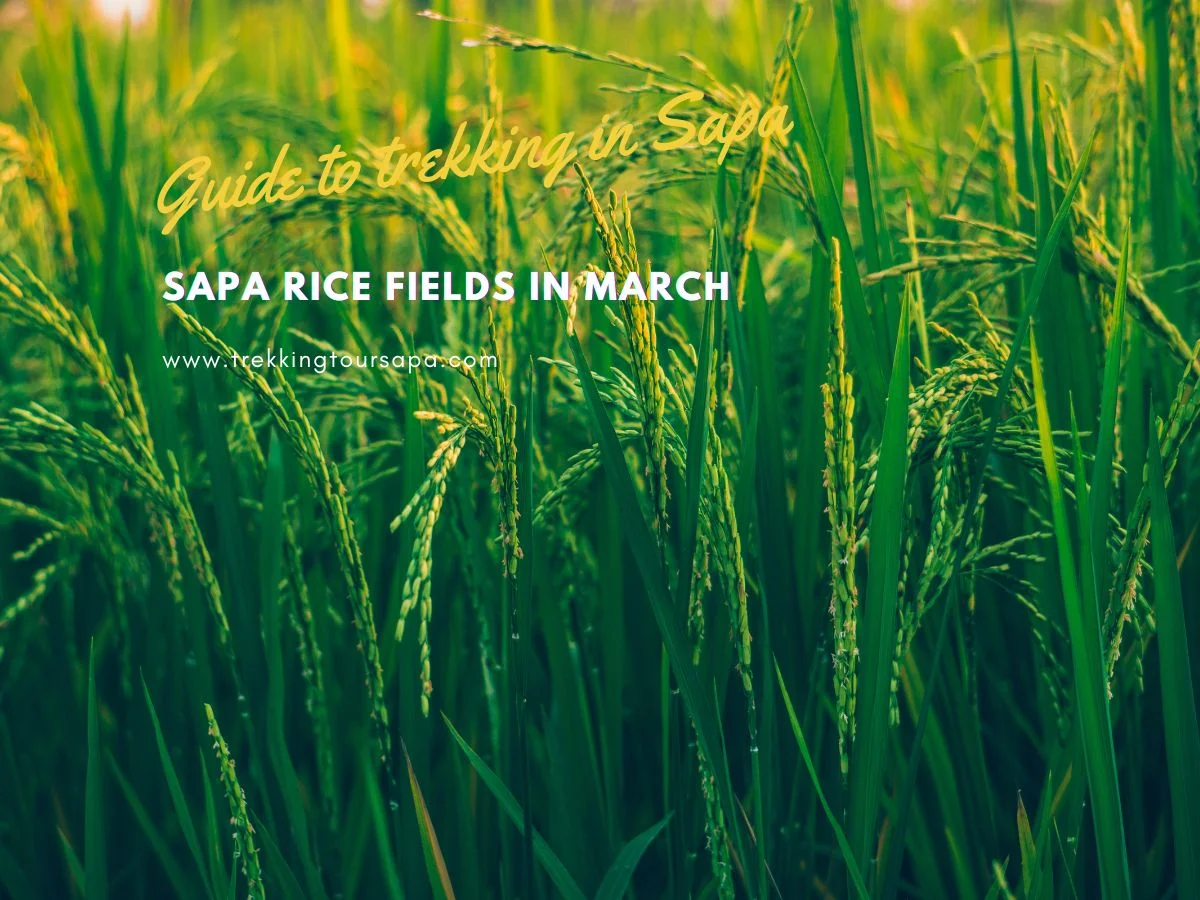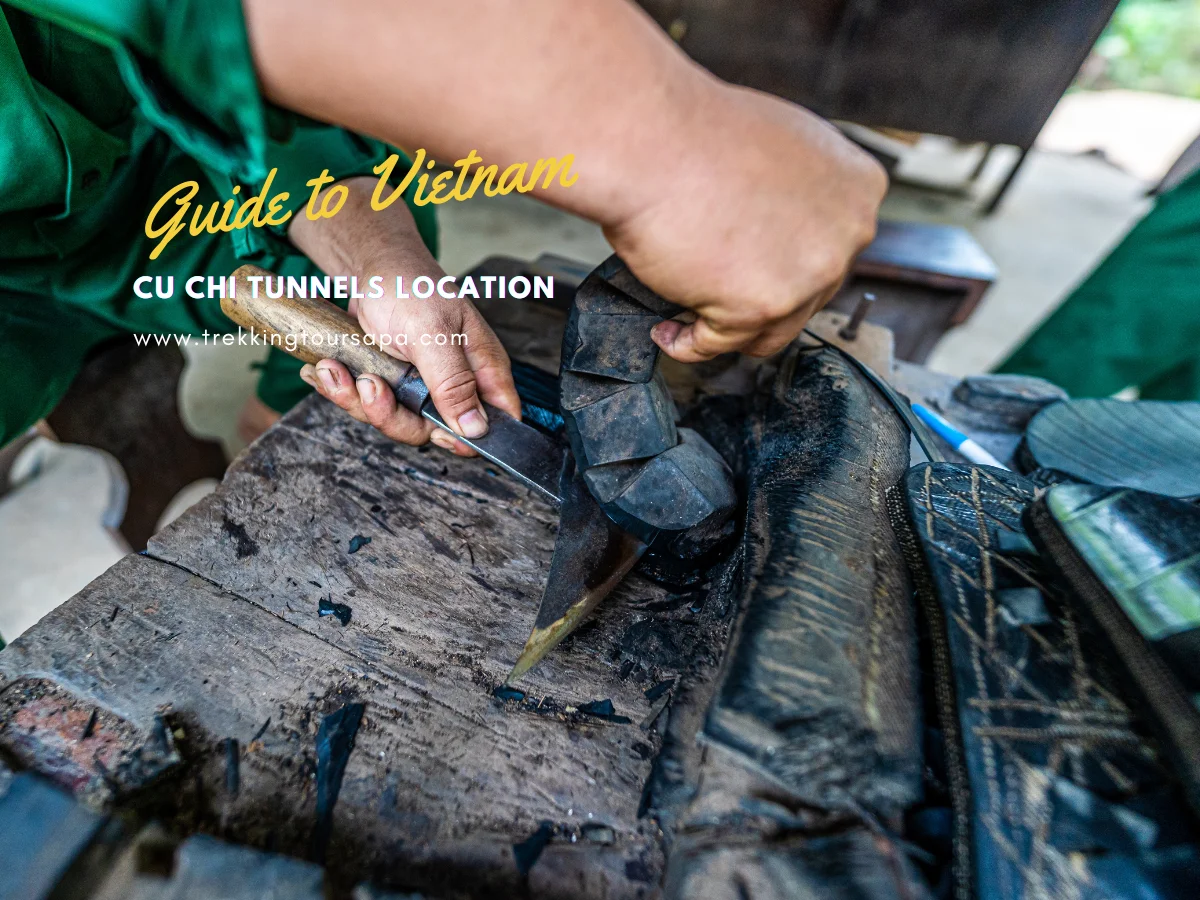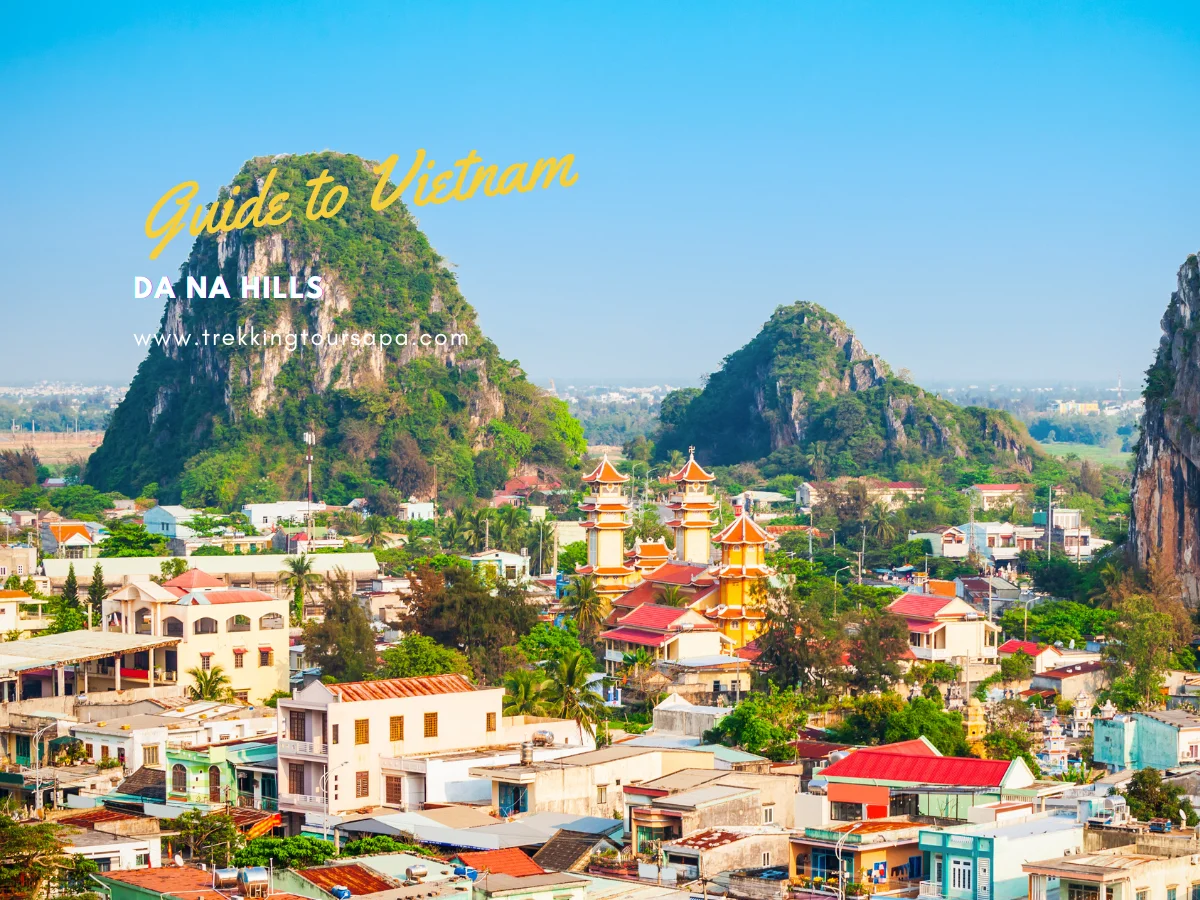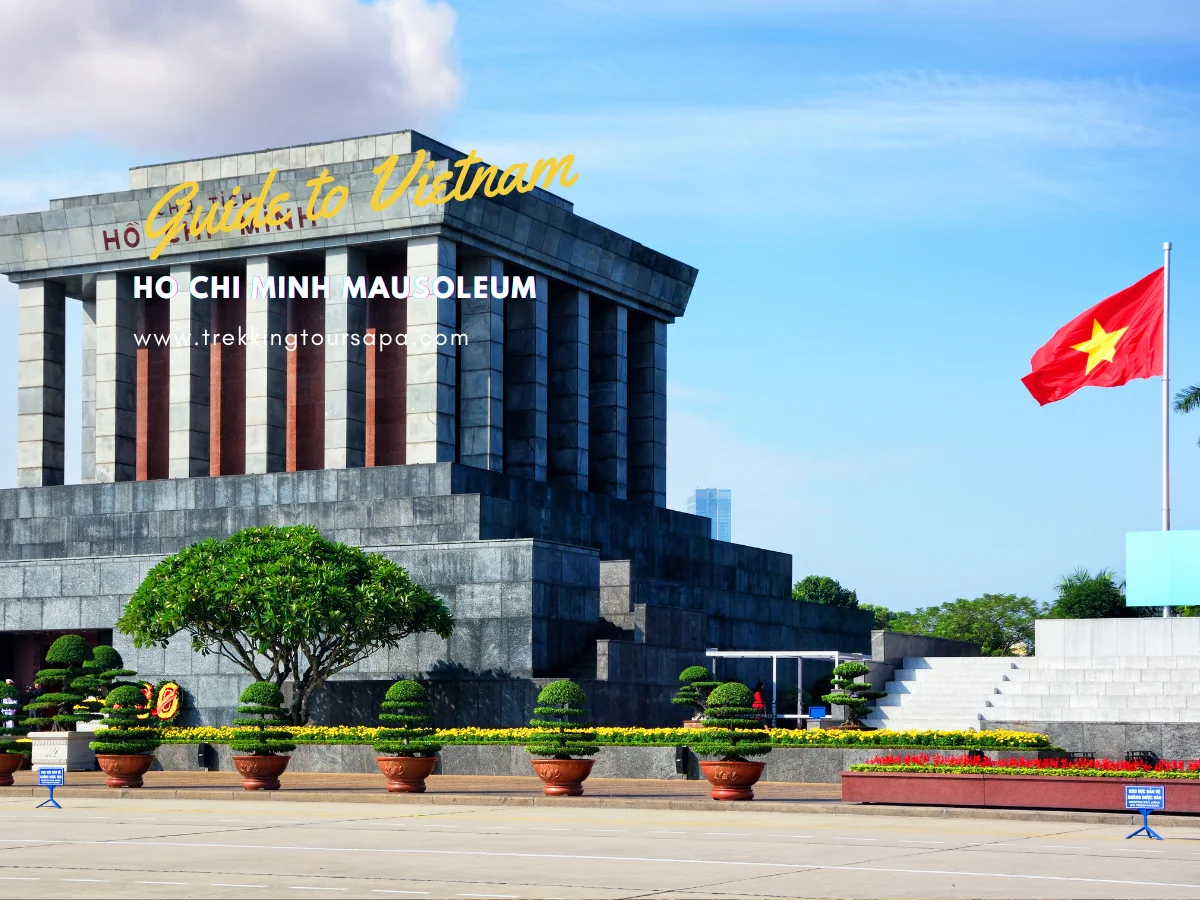Are you seeking a truly breathtaking experience that allows you to connect with nature and immerse yourself in the culture of Vietnam? Look no further than Sapa and its stunning rice fields, particularly during the month of March. Located in the northwest region of Vietnam, Sapa is known for its terraced rice fields that are rich in cultural significance and natural beauty.
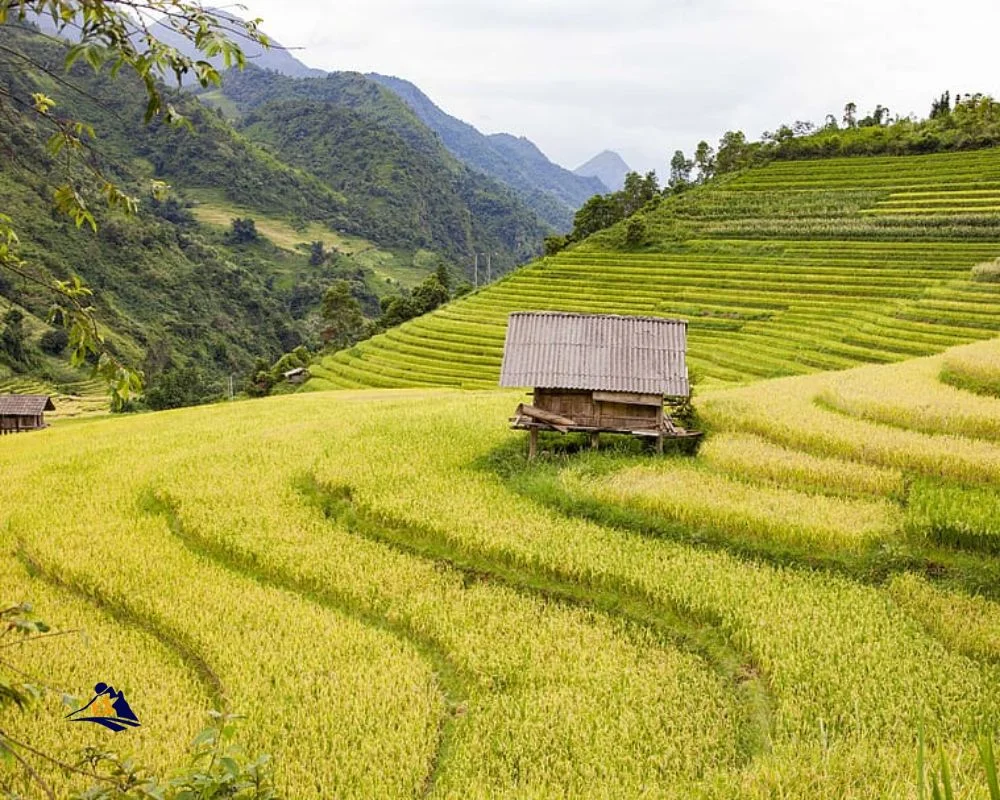
As you wander through the lush green hillsides adorned with vibrant yellow rice paddies, you’ll be transported to a world unlike any other. Rice is an integral part of Vietnamese culture, representing not only sustenance but also prosperity and blessings. By visiting Sapa’s rice fields in March, you’ll witness the start of a new growing season as locals plant their crops and prepare for harvest later in the year. This time of year offers a unique opportunity to witness traditional farming practices while soaking up stunning panoramic views that will leave you awestruck.
Table of Contents
ToggleOverview of Sapa and Its Location
You’re in for a treat as you discover the charming town of Sapa and its stunning location nestled amidst towering mountains and lush greenery. Located in the northern part of Vietnam, Sapa is a popular destination among tourists who seek to experience the country’s rich culture and natural beauty. The town boasts breathtaking views of rice terraces that stretch out as far as the eye can see, making it an ideal place to visit during March when the fields are at their greenest.

Sapa tourism has boomed over recent years, but despite this growth, locals have managed to maintain their traditional way of life. You’ll find that Sapa’s ethnic minority tribes still practice age-old customs and traditions that have been passed down from generation to generation. These traditions are deeply rooted in agriculture, which is why rice cultivation plays a significant role not only in local livelihoods but also in Vietnamese culture as a whole.
The Cultural Significance of Rice in Vietnam
Rice plays a significant role in Vietnam’s cultural identity, with its cultivation and consumption deeply intertwined with the country’s traditions and way of life. Rice cultivation techniques have been passed down through generations, and it is considered an art form that requires skill, patience, and hard work. The rice paddies serve as a source of livelihood for many Vietnamese families who maintain the fields using traditional methods.

Furthermore, rice is not just a staple food in Vietnam; it also represents social status and hospitality. Traditional rice dishes like pho (rice noodle soup) or com tam (broken rice) are enjoyed by all classes of people at various occasions such as weddings, funerals, or Tet (Vietnamese New Year). From planting to harvesting to cooking, every aspect of rice production involves shared values and community spirit. With this background in mind, let us now explore the breathtaking terraced rice fields of Sapa!
The Terraced Rice Fields of Sapa
When you visit the terraced rice fields of Sapa, you’ll marvel at how they were created by the Hmong people over centuries. The steep hillsides are transformed into a series of flat platforms that enable water to flow down from one level to another. The result is a visually stunning landscape that showcases the unique aesthetic of Vietnamese rice fields.
Sapa 1 Day Tours
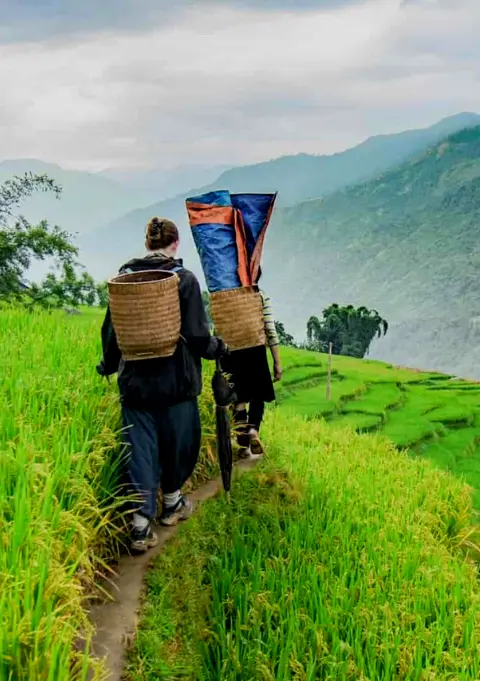
- 1 day experience
- Moderate to challenging
- Cultural immersion & active adventure
- Rice fields, valleys & villages
- Private tours
- Vegan-friendly
Sapa 2 Day Tours
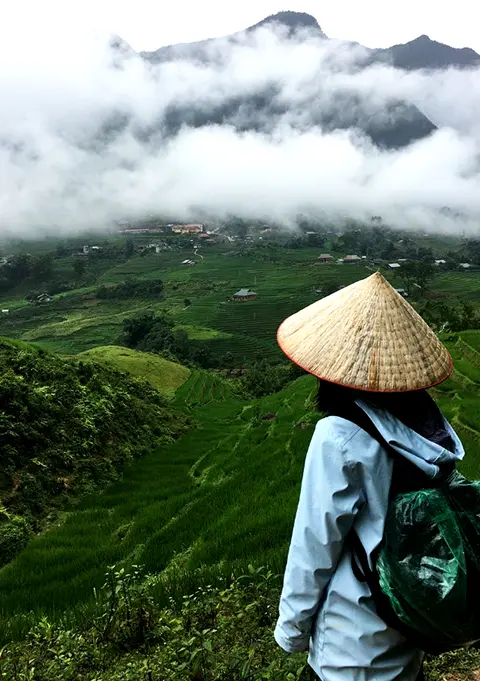
- 2 days 1 night experience
- Moderate to challenging
- Cultural immersion & active adventure
- Mountains, valleys, rice fields and villages
- Private tours
- Vegan-friendly
Sapa 3 Day Tours
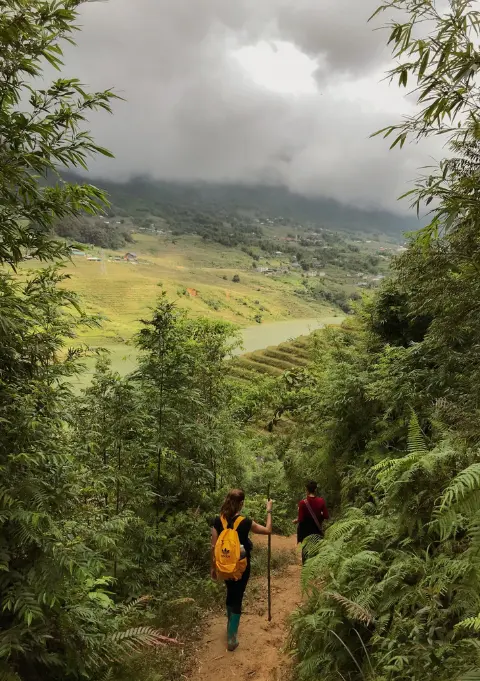
- 3 days 2 night experience
- Moderate to challenging
- Cultural immersion & active adventure
- Mountains, valley, rice fields & villages
- Private tours
- Vegan-friendly
Sapa 4 Day Tours
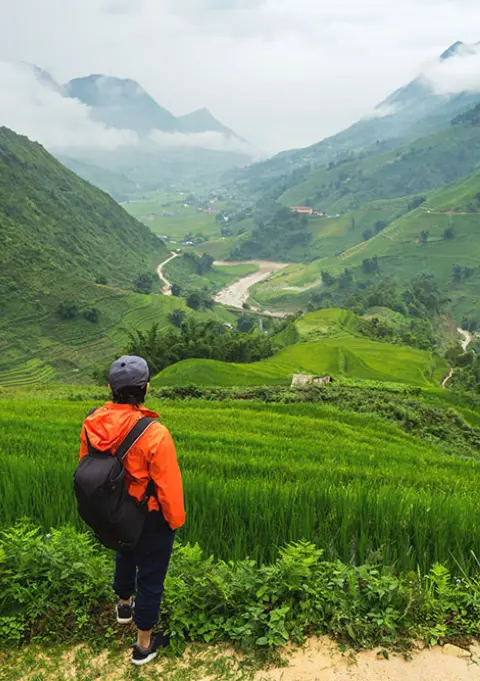
- 4 days 3 night experience
- Moderate to challenging
- Cultural immersion & active adventure
- Mountains, valleys, rice fields & villages
- Private tours – Less Touristic
- Vegan-friendly
How the Fields are Created
Now let me tell you how these stunning landscapes come to life during this time of year. The terraced rice fields of Sapa are created through centuries-old field construction techniques that involve carving out the sides of the mountains to create levelled terraces for planting rice. These terraces provide a stable foundation for growing rice as they prevent soil erosion and allow water to be distributed evenly across each level. In addition, irrigation systems are put in place to ensure that each terrace receives an adequate amount of water.

The process of creating these fields is not only labour-intensive but also requires a great deal of skill and knowledge about the local terrain. It involves building stone walls along the contours of the mountain slopes and filling them with soil to create flat surfaces for planting. This technique has been passed down from generation to generation, making it an important part of Sapa’s cultural heritage. Now that you understand how these intricate fields are constructed, let’s explore the unique aesthetic of the rice fields during March.
The Unique Aesthetic of the Rice Fields
Like a painter’s brush on a canvas, nature transforms the rugged mountain slopes into a masterpiece during March in Sapa. The rice fields take on a unique aesthetic that is unparalleled in other parts of the world. With vibrant shades of green and yellow stretching as far as the eye can see, these rice fields are perfect for photography enthusiasts who want to capture stunning images of Vietnam’s countryside.

In addition to being picturesque, Sapa rice fields offer cultural tourism experiences that allow you to immerse yourself in local traditions. You can learn about the Hmong people who have been cultivating these fields for centuries and gain insight into their way of life. Visiting these rice fields is an opportunity to connect with nature and experience one of Vietnam’s most iconic landscapes firsthand. And if you’re wondering when the best time to visit Sapa rice fields is, keep reading to find out more.
The Best Time to Visit Sapa Rice Fields
Discover the optimal time for a breathtaking experience amidst the lush greenery of Sapa’s rice terraces. If you’re looking to take stunning photographs or witness local festivals, March is the perfect month to visit. During this time, the rice fields are in full bloom and the weather is mild enough to enjoy long walks around the area.

March also offers visitors a chance to witness some unique cultural events. Many villages in Sapa hold traditional ceremonies during this time, celebrating important dates on their calendar. You can immerse yourself in these festivities while taking in the stunning views of the rice fields from various vantage points. Make sure to check out some of the best photography spots as well, such as Muong Hoa Valley and Ta Phin Village.
To get to Sapa from Hanoi, there are several options available including taking a bus or train. However, if you’re looking for a more scenic journey, consider taking a private car or motorbike tour through Vietnam’s beautiful countryside before arriving at your destination.
Sapa 1 Day Tours

- 1 day experience
- Moderate to challenging
- Cultural immersion & active adventure
- Rice fields, valleys & villages
- Private tours
- Vegan-friendly
Sapa 2 Day Tours

- 2 days 1 night experience
- Moderate to challenging
- Cultural immersion & active adventure
- Mountains, valleys, rice fields and villages
- Private tours
- Vegan-friendly
Sapa 3 Day Tours

- 3 days 2 night experience
- Moderate to challenging
- Cultural immersion & active adventure
- Mountains, valley, rice fields & villages
- Private tours
- Vegan-friendly
Sapa 4 Day Tours

- 4 days 3 night experience
- Moderate to challenging
- Cultural immersion & active adventure
- Mountains, valleys, rice fields & villages
- Private tours – Less Touristic
- Vegan-friendly
How to Get to Sapa
If you’re planning a trip to explore the lush greenery of Sapa’s terraced landscape, getting there is half the fun. There are various transportation options to choose from depending on your budget and preference. Here are some of the most popular ways to get to Sapa:
- Overnight train: Taking an overnight train from Hanoi is a popular option for travelers seeking an affordable and comfortable way to reach Sapa. The train journey typically takes around 8 hours, and there are different classes available ranging from basic seats to private cabins with air conditioning.
- Private car or motorbike tour: For those who prefer a more personalized experience, taking a private car or motorbike tour through Vietnam’s breathtaking countryside should definitely be on your itinerary. This option allows you to stop at scenic spots along the way and take in the stunning views at your own pace.
- Bus: If you’re traveling on a tight budget, taking a bus from Hanoi is another viable option. The journey takes around 5-6 hours, depending on traffic conditions.
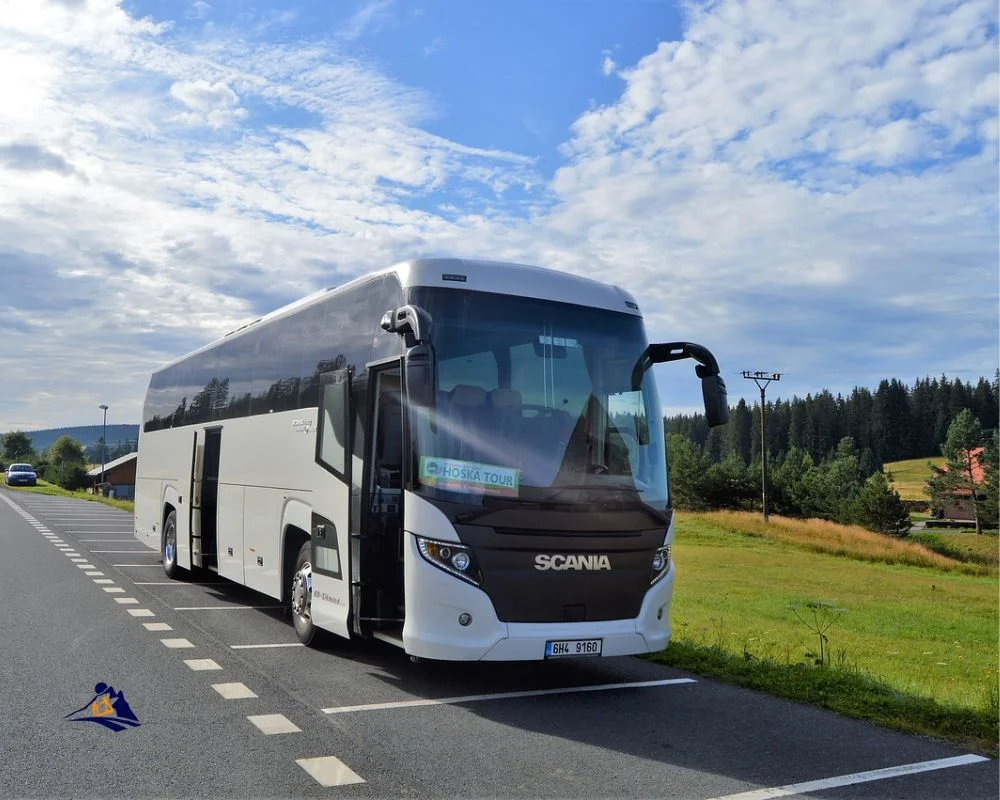
Once you’ve arrived in Sapa, there are plenty of accommodation choices ranging from luxury resorts to budget-friendly homestays with local families. But before settling down into your chosen accommodation, make sure that you have enough time left for all the exciting activities that await you in this beautiful region!
Activities to Enjoy in Sapa
If you’re looking for an adventure-filled trip, Sapa has plenty of activities to offer. Hiking and trekking are popular options that let you explore the breathtaking scenery of the rice fields and mountains. You can also visit local villages and learn about the culture and traditions of the ethnic minorities in the area. Don’t forget to take some time to wander around Sapa town as well, where you’ll find picturesque streets and bustling markets.
Hiking and Trekking
You’ll love exploring the rugged terrain and breathtaking landscapes while trekking through Sapa’s rice fields in March. With various hiking routes to choose from, you can tailor your trek based on your fitness level and desired intensity. Whether you want to take a leisurely stroll or challenge yourself with an advanced hike, there’s something for everyone.
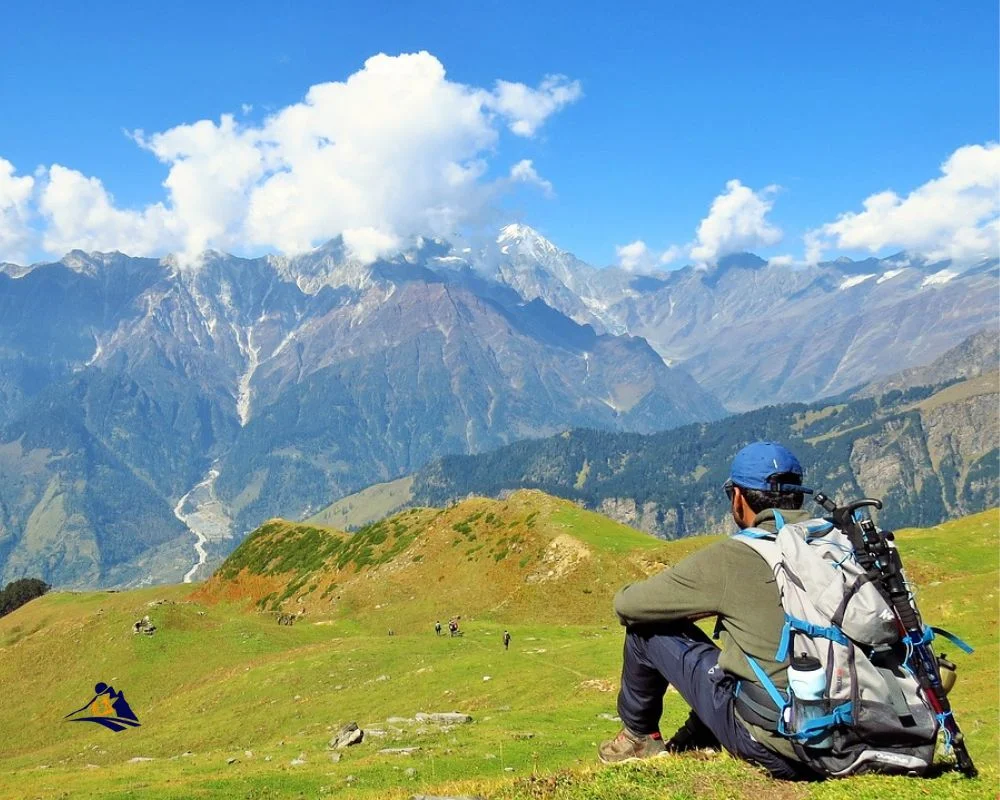
To truly immerse yourself in the local culture, consider hiring a local guide who can show you hidden gems and share their knowledge of the area. Not only will they help ensure your safety on the trails, but they can also provide insight into the history and traditions of the ethnic minority communities that call Sapa home. As you hike through stunning vistas filled with vibrant green rice paddies and towering mountains, you’ll feel a sense of freedom that comes from being surrounded by nature at its finest.
As you finish up your trek, don’t forget to make time for visiting local villages where you can learn about traditional handicrafts and sample delicious homemade cuisine. Through hiking and immersing yourself in the local culture, you’ll gain a deeper appreciation for all that this beautiful region has to offer.
Sapa 1 Day Tours

- 1 day experience
- Moderate to challenging
- Cultural immersion & active adventure
- Rice fields, valleys & villages
- Private tours
- Vegan-friendly
Sapa 2 Day Tours

- 2 days 1 night experience
- Moderate to challenging
- Cultural immersion & active adventure
- Mountains, valleys, rice fields and villages
- Private tours
- Vegan-friendly
Sapa 3 Day Tours

- 3 days 2 night experience
- Moderate to challenging
- Cultural immersion & active adventure
- Mountains, valley, rice fields & villages
- Private tours
- Vegan-friendly
Sapa 4 Day Tours

- 4 days 3 night experience
- Moderate to challenging
- Cultural immersion & active adventure
- Mountains, valleys, rice fields & villages
- Private tours – Less Touristic
- Vegan-friendly
Visiting Local Villages
Explore the rich local culture of Sapa by visiting its charming villages, where you can discover traditional handicrafts and indulge in mouthwatering homemade cuisine – did you know that Sapa is home to over 6 ethnic minority groups? The locals are warm and welcoming, eager to share their stories and traditions with visitors. Embark on a journey of cultural exchange as you immerse yourself in the daily life of these communities.
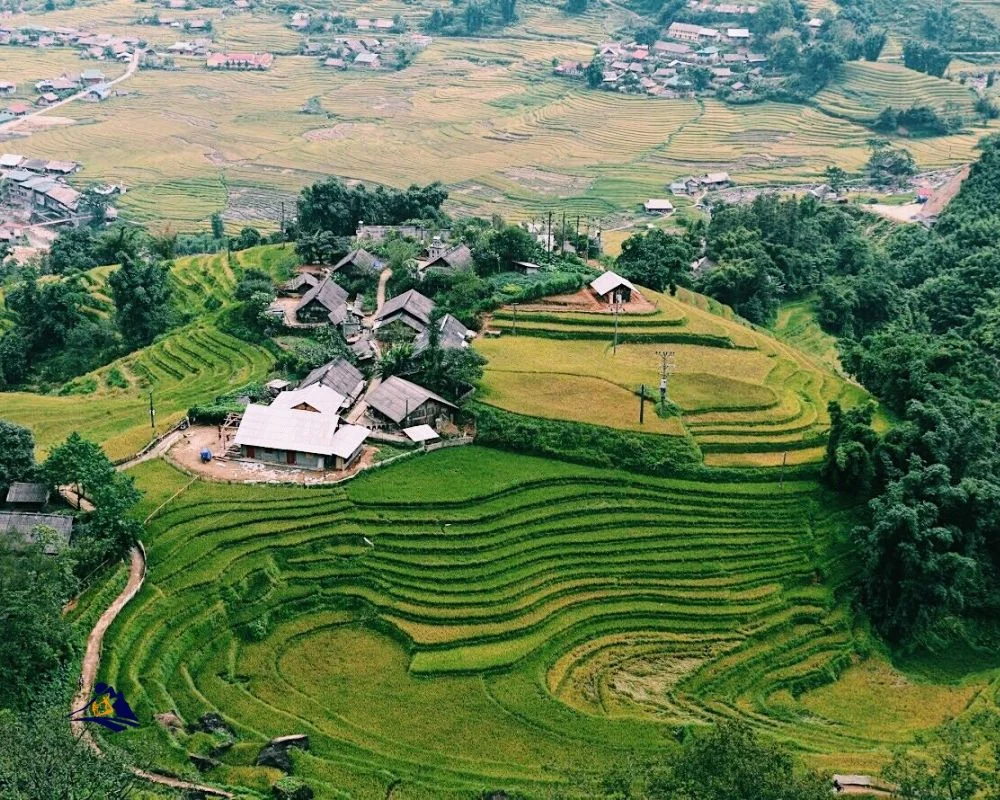
Here are some must-visit villages during your trip to Sapa:
- Cat Cat Village: This H’mong village is famous for its stunning waterfalls and intricate handicrafts.
- Ta Van Village: Home to both Giay and Red Dao communities, this village offers breathtaking views of rice terraces.
- Lao Chai Village: Located at the foot of Mount Fansipan, this village gives visitors a glimpse into the daily life of the Black H’mong people.
As you explore these villages, don’t be afraid to ask questions and learn about local traditions. You might even have the opportunity to participate in traditional activities such as weaving or cooking. By immersing yourself in the local culture, you’ll gain a deeper appreciation for Sapa’s rich history and diversity.
Now that you’ve experienced authentic village life, it’s time to head back into town for some urban exploration.
Sapa 1 Day Tours

- 1 day experience
- Moderate to challenging
- Cultural immersion & active adventure
- Rice fields, valleys & villages
- Private tours
- Vegan-friendly
Sapa 2 Day Tours

- 2 days 1 night experience
- Moderate to challenging
- Cultural immersion & active adventure
- Mountains, valleys, rice fields and villages
- Private tours
- Vegan-friendly
Sapa 3 Day Tours

- 3 days 2 night experience
- Moderate to challenging
- Cultural immersion & active adventure
- Mountains, valley, rice fields & villages
- Private tours
- Vegan-friendly
Sapa 4 Day Tours

- 4 days 3 night experience
- Moderate to challenging
- Cultural immersion & active adventure
- Mountains, valleys, rice fields & villages
- Private tours – Less Touristic
- Vegan-friendly
Exploring Sapa Town
Let’s dive into the bustling streets and vibrant energy of Sapa Town, where you can indulge in local cuisine and shop for souvenirs to bring back home. The town is filled with small shops and stalls selling a variety of local handicrafts, such as intricately woven textiles, handmade jewelry, and carved wooden sculptures. Take your time browsing through the colorful displays and chatting with the friendly vendors who are happy to share their stories and traditions with you.
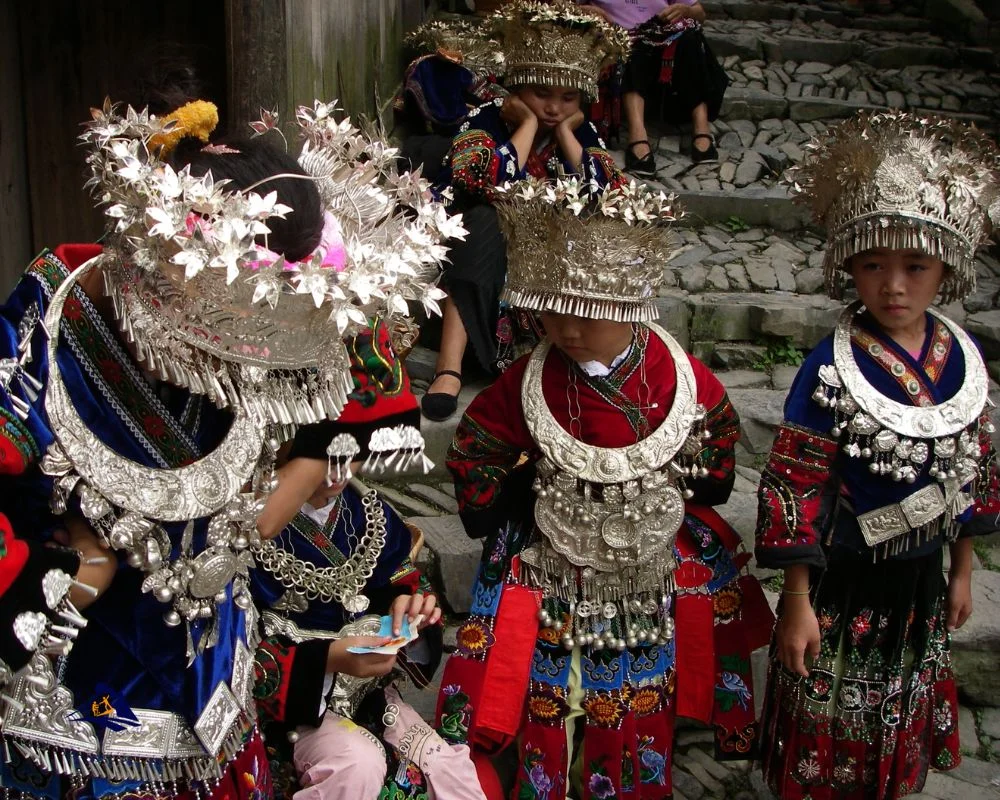
When it comes to exploring cuisine, Sapa Town offers a diverse range of options that will satisfy any foodie’s cravings. From traditional Vietnamese dishes like pho and banh mi to more unique regional specialties like bamboo tube rice or grilled buffalo meat, there’s something for every palate. Be sure to try some of the locally grown herbs and spices that add a unique flavor to many dishes. As you savor your meal, take in the lively atmosphere around you – locals going about their daily routines while tourists soak up the sights and sounds.
As you finish your meal or shopping spree in Sapa Town, keep in mind the importance of sustainable tourism practices in preserving this beautiful region. Let’s explore how we can continue enjoying all that Sapa has to offer while also supporting its long-term conservation efforts.
Sapa 1 Day Tours

- 1 day experience
- Moderate to challenging
- Cultural immersion & active adventure
- Rice fields, valleys & villages
- Private tours
- Vegan-friendly
Sapa 2 Day Tours

- 2 days 1 night experience
- Moderate to challenging
- Cultural immersion & active adventure
- Mountains, valleys, rice fields and villages
- Private tours
- Vegan-friendly
Sapa 3 Day Tours

- 3 days 2 night experience
- Moderate to challenging
- Cultural immersion & active adventure
- Mountains, valley, rice fields & villages
- Private tours
- Vegan-friendly
Sapa 4 Day Tours

- 4 days 3 night experience
- Moderate to challenging
- Cultural immersion & active adventure
- Mountains, valleys, rice fields & villages
- Private tours – Less Touristic
- Vegan-friendly
Sustainable Tourism in Sapa
Sustainable tourism practices are crucial for the preservation of natural environments and the economic growth of local communities. When it comes to Sapa, there are plenty of ecotourism opportunities that allow you to immerse yourself in the stunning scenery while supporting the local people. One such opportunity is a homestay program in a small village near Sapa where you can experience traditional crafts and culinary skills first-hand. The residents benefit from this program as they generate income through showcasing their culture, which is not only beneficial for them but also for the preservation of their way of life.

Community involvement plays a significant role in sustainable tourism practices, and Sapa is no exception. You can participate in community-based tours where you learn about different aspects of local life while contributing to their economy. For instance, there are programs where you can help with planting rice or other crops, learn how to cook traditional dishes, or weave fabrics using age-old techniques. Through these activities, you gain an understanding of local culture and contribute positively to its sustainability.
As travelers who appreciate freedom and adventure, it’s essential to be mindful of our impact on the places we visit. By engaging in sustainable tourism practices like those found in Sapa’s homestay programs and community-based tours, we can ensure that future generations will have access to these beautiful environments while also supporting the livelihoods of local communities. With this awareness at heart, let’s move onto some final thoughts about what makes Sapa rice fields so unique!
Sapa 1 Day Tours

- 1 day experience
- Moderate to challenging
- Cultural immersion & active adventure
- Rice fields, valleys & villages
- Private tours
- Vegan-friendly
Sapa 2 Day Tours

- 2 days 1 night experience
- Moderate to challenging
- Cultural immersion & active adventure
- Mountains, valleys, rice fields and villages
- Private tours
- Vegan-friendly
Sapa 3 Day Tours

- 3 days 2 night experience
- Moderate to challenging
- Cultural immersion & active adventure
- Mountains, valley, rice fields & villages
- Private tours
- Vegan-friendly
Sapa 4 Day Tours

- 4 days 3 night experience
- Moderate to challenging
- Cultural immersion & active adventure
- Mountains, valleys, rice fields & villages
- Private tours – Less Touristic
- Vegan-friendly
Conclusion and Final Thoughts
Now that you’ve learned about sustainable tourism in Sapa, it’s time for some final reflections on the impact of your visit to the rice fields. As a responsible traveler, you took steps to minimize your footprint and support local communities. By choosing eco-friendly accommodations and purchasing handmade souvenirs from local artisans, you helped contribute to the preservation of this beautiful region.

But beyond these tangible actions, your mere presence as a tourist has an impact on the environment and culture of Sapa. It’s important to acknowledge this and strive for mindful travel practices that minimize negative impacts while maximizing positive ones. Through introspection and conscious decision-making, we can all make a difference in preserving the beauty and authenticity of places like Sapa for future generations to enjoy.
Sapa Rice Fields In March Frequently Asked Questions
What is the history of the Sapa rice fields?
If you’re curious about the history of the Sapa rice fields, it’s clear that they hold immense cultural significance. These terraced fields have been cultivated by the Hmong people for centuries as a means of survival and sustenance in the mountainous region of northern Vietnam. But beyond their practical purpose, the rice fields have also become a symbol of tradition and community for the Hmong people. In recent years, they’ve also had a significant impact on tourism in Vietnam, drawing visitors from all over the world to witness their stunning beauty firsthand. Whether you’re drawn to them for cultural or aesthetic reasons, there’s no denying that a visit to these rice fields is an experience you won’t soon forget.
What are the different types of rice grown in the Sapa region?
As you venture into the rice fields of Sapa, you’ll be greeted with a vast array of rice varieties that are grown using age-old cultivation techniques. From sticky glutinous rice to aromatic jasmine rice, each variety is distinct in taste and texture, making it a culinary adventure for your taste buds. The Hmong people, who have been cultivating these fields for centuries, use traditional methods such as crop rotation and natural fertilizers to ensure a sustainable harvest. As you immerse yourself in this rich culture and witness firsthand how the locals tend to their crops with utmost care and precision, you’ll gain a deeper appreciation for the art of rice farming and the freedom that comes with self-sufficiency.
Are there any traditional rice harvesting methods still used in Sapa?
If you’re curious about traditional techniques used in rice harvesting, the Sapa region may have just what you’re looking for. The cultural significance of rice farming has been passed down through generations, and many farmers still utilize methods that were used hundreds of years ago. From hand-plowing to threshing by foot, these techniques require a level of skill and patience that is truly impressive. Not only do these practices celebrate the rich history of agriculture in the region, but they also preserve an important part of Vietnamese heritage. So if you value tradition and want to learn more about how people have cultivated rice in Sapa for centuries, be sure to explore the unique methods still being used today.
How do the rice fields benefit the local economy?
Imagine a bustling community where the fields are alive with vibrant green rice stalks swaying in the wind like dancers in a performance. This is what you can expect when exploring the local impact of sustainable farming practices in Sapa. The rice fields not only provide food for the locals but also serve as a source of income for many families. Furthermore, these traditional methods have been preserved throughout generations and continue to be passed down to younger farmers, ensuring that this way of life remains intact for years to come. Sustainable farming not only benefits the local economy but also helps preserve the environment by reducing harmful chemicals and promoting biodiversity. By supporting this method of agriculture, you’re not just contributing to a community’s livelihood; you’re helping safeguard our planet’s future.
What conservation efforts are being made to protect the Sapa rice fields?
Conservation initiatives have been put in place to protect the Sapa rice fields and preserve their beauty for future generations. These efforts include promoting sustainable agriculture practices, limiting access to certain areas, and educating visitors on the importance of conservation. The impact on tourism has been positive as well, with many tourists seeking out destinations that prioritize environmental protection. By balancing conservation efforts with economic benefits, the Sapa rice fields can continue to thrive while also contributing to the local economy. So whether you’re an eco-conscious traveler or simply appreciate stunning natural landscapes, a visit to these protected rice fields is sure to leave you feeling inspired and fulfilled.
Conclusion
So, you’ve reached the end of this article and learned about the breathtaking beauty of Sapa rice fields in March. But beyond just its visual appeal, these terraced fields are a symbol of Vietnam’s deep-rooted cultural connection to rice cultivation. As you stand amidst the verdant greenery, surrounded by the misty mountain ranges, take a moment to reflect on what this land has endured over centuries.
The resilience of the Vietnamese people and their ability to sustainably grow crops on steep hillsides is truly remarkable. By visiting Sapa and supporting sustainable tourism initiatives, you can contribute towards preserving this unique way of life for future generations. So why not plan your next trip to experience firsthand the magic of Sapa rice fields? It will be an unforgettable journey that offers meaningful insights into one of Vietnam’s most precious cultural treasures.
Sapa 1 Day Tours

- 1 day experience
- Moderate to challenging
- Cultural immersion & active adventure
- Rice fields, valleys & villages
- Private tours
- Vegan-friendly
Sapa 2 Day Tours

- 2 days 1 night experience
- Moderate to challenging
- Cultural immersion & active adventure
- Mountains, valleys, rice fields and villages
- Private tours
- Vegan-friendly
Sapa 3 Day Tours

- 3 days 2 night experience
- Moderate to challenging
- Cultural immersion & active adventure
- Mountains, valley, rice fields & villages
- Private tours
- Vegan-friendly
Sapa 4 Day Tours

- 4 days 3 night experience
- Moderate to challenging
- Cultural immersion & active adventure
- Mountains, valleys, rice fields & villages
- Private tours – Less Touristic
- Vegan-friendly
